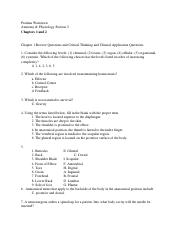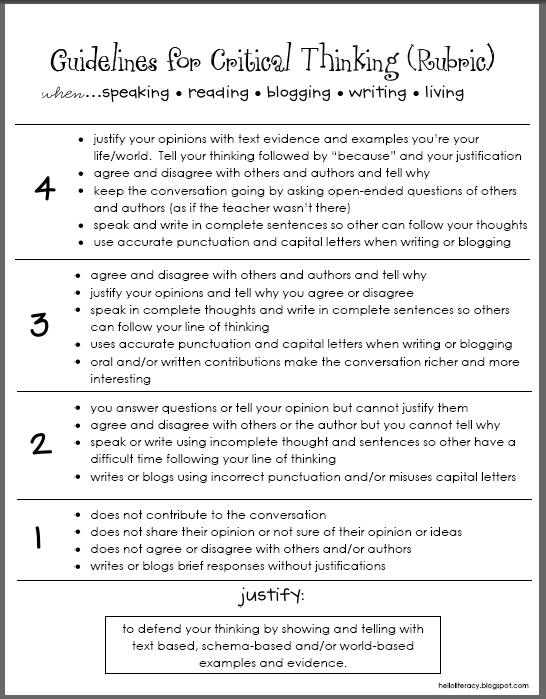
Nov 01, · Halpern () defines it as a purposeful goal directed thinking. Critical Thinking is an essential component of Nursing since a nurse is always, by profession, confronted with complex situations, which demand accurate judgments, clinical decision-making Forgot Password? Enter your ctcLink ID and we'll send you a link to change your password We would like to show you a description here but the site won’t allow blogger.com more
NTS/NMMS Examination
edu no longer supports Internet Explorer. To browse Academia. edu and the wider internet faster and more securely, please take a few seconds to upgrade your browser. Log In with Facebook Log In with Google Sign Up with Apple.
Remember me on this computer. Enter the email address you signed up with and we'll email you a reset link. Need an account? Click here to sign up. Download Free PDF. THE CONCEPT OF CRITICAL THINKING CHAPTER 3 LECTURE NOTES FOR Logical reasoning, conceptualization and critical Ngang Perez. Download PDF Download Full PDF Package This paper.
A short summary of this paper. THE CONCEPT OF CRITICAL THINKING. COURSE OVERVIEW AND OUTLINE 1. Course Description: This course provides students with a general overview on the concept of critical thinking and logical reasoning. It establishes a balance approach to think more and think better be it politically, culturally, economically and socially.
Critical thinking is thinking clearly and rationally. It involves thinking precisely and systematically, critical thinking application papers unit 4, and following the rules of logic and scientific reasoning, among other things. As such the study, equips students with the technical skills to a tremendous force of constructive argument. Thus the topics understudy will include focal areas such as; logic and reasoning, structure and parts of argument, the concept of critical thinking amongst others.
critical thinking application papers unit 4 What Critical Thinking is! Groarke and Cristopher W, Tindale Good reasoning matters: A constructive approach to critical thinking.
The pyramid principle: Logic in writing and thinking 3rd edition. Prentice Hall. and Ormiston, M. Creative idea generation: Harmony versus stimulation. European Journal of Social Psychology, 37 3 An examination of different explanations for the mere exposure effect.
Journal of Consumer Research, 34 1 Critical thinking, critical thinking application papers unit 4. However, it critical thinking application papers unit 4 not all types of thinking that is productive or relevant to our own very existence. Although we have the natural abilities to think as humans, critical thinking application papers unit 4 mental ability is an art and a craft.
Consequently, the art of correct thinking can be acquired through learning. There are several different types of thinking such as: creative thinking, critical thinking application papers unit 4, design thinking, innovative thinking, positive thinking, and of course critical thinking.
For the purpose of this course, we will concentrate on critical thinking. how to 3. The subject is complex, and several different definitions exist, which generally include the rational, critical thinking application papers unit 4, skeptical, unbiased analysis, or evaluation of factual evidence.
An understanding of all the respective critical thinking application papers unit 4 of thought makes the concept very complex. However, it can be seen that they all emphasize the importance of clarity and rationality. Many people traced the importance of critical thinking in education to Dewey. But Dewey did not make very extensive use of the term "critical thinking". In this chapter we will look at some aspects of critical thinking in the age of globalization, the misconceptions about critical thinking and a host of other factors.
Stay tune! First of all, we are increasingly faced with complex problems that affect the whole world, whether it is global warming, pollution, financial crises, or new epidemics. We need good thinking and creative ideas to coordinate efforts to solve these problems.
At the personal level, globalization brings about an ever-quickening pace of life. We have a huge amount of information available, but what we learn today might easily become obsolete tomorrow.
Although fast changes also bring new opportunities, we now have to compete with talented people across the world. To be successful in this environment, we need good thinking skills that can help us make reliable decisions and acquire new knowledge quickly. But what do we mean by good thinking skills? Basically, it comes down to two things—critical thinking and creativity. As for creativity, it is a matter of coming up with new and useful ideas, generating alternative possibilities.
This subsection is about these two sets of thinking skills, but at this point, you might ask, which is more important, critical thinking or creativity? The short answer is that they are equally important.
We need creativity to come up with ideas to solve problems, but we also need critical thinking to evaluate and improve these ideas. They complement each other, and we need both to survive and to prosper.
These misconceptions have negative consequences on people who are willing to acquire skills and become effective critical thinkers. This means always employing a negative criticism of the arguments people make. This is not true because as we are going to see, it has to do with making a balanced judgment about the truthfulness of an argument. Impartiality and objectivity are core values of the art of critical thinking.
It has to do with making a faire judgment of your own claim or argument and that of others. On the contrary it involves being an active contributor in debates and discussions and to defend your own arguments and claims. They act on the basis of self-interest, emotion, or personal relationships.
The first problem with this objection is that it confuses rational thinking with talking about reasons. But we can still use critical thinking to think strategically about the best means to achieve our objectives.
Consider for example love and friendship. They are certainly valuable, but critical thinking can help us cultivate them. For example, thinking carefully about what is good or bad about a relationship can help us improve it and make it more fulfilling.
Besides, it is not always wise to act solely on the basis of emotions. They can be biased by ego, fear, and greed. Thinking more about our decisions can counteract this problem. Thinking is a mental activity that the mind engages in with the help of the senses. Although the Rationalist proponents are in strong support of their theory of innatism which argues that man is born with innate ideas, the Empiricist school rejects this theory.
The leading proponent of the Empiricist school and distinguished British philosopher, John Locke argues that at birth, the human mind is like a tabula rasa a black sheet of paper. Hence whatever the mind acquires is from experience. Therefore, critical thinking application papers unit 4, to him, knowledge comes from experience and not inborn because it is the sense that feed the mind with ideas to perform its functions.
The word critical in Latin is criticus and in Greek is Kritokos, both meaning able to make judgment. There are several definitions of critical thinking as this concept has been under research for several decades. Among the numerous definitions advanced by scholars in this discipline, that of Robert Ennis is one of the most explicit.
He defines critical thinking as reasonable reflective thinking that is aimed at deciding what to belief or what to do David Hunter, There are some key elements of this definition worth revisiting. It is reasonable because there is a method that needs to be applied in working out things. This refers to thinking that pushes us to question our thoughts and decisions and that of others as well. We are bound to question any information, action or object that do not appear intellectually satisfactory to us.
We have mentioned before that critical thinking leads us towards what to believe in the sense that it is a matter of what the facts or evidence are. For example, to say it is rainy outside is a fact, critical thinking application papers unit 4.
It critical thinking application papers unit 4 involves reasoning about what the facts are and this is known as theoretical reasoning To say critical thinking leads us towards what to do involve two key elements: what to value or what to strive for.
It has to do with your goal and the best means to attain that goal. It is all about focusing on the right idea and the right action to take. For example, should I buy a new dress now or continue with the old ones? Decisions about what to value are among the most difficult and profound decisions we can make. But critical thinking can help us to make some of these decisions. Hence deciding what to do involves reasoning about what to do and how to do it.
This is call practical reasoning. To think critically on what to belief or what to do is reasonable because we have to have not just reasons but good ones for the decisions we make. Within the context of critical thinking, skepticism gives us the ability to apply doubts in certain situations. It does not mean we doubt everything we hear and see, critical thinking application papers unit 4.
Unit 4 . Analytical and Critical Thinking (Part-1)
, time: 15:41The Kibitzer's Cafe - Chess Discussion Forum

We would like to show you a description here but the site won’t allow blogger.com more Examination Subject: The NMMS examination consists of two papers. Mental Ability Test (MAT): Consists of 90 multiple choice items on reasoning and critical thinking to be answered in 90 mintues. The questions will be on analogy, classification, numerical series, pattern, perceptron,hidden figures, blogger.com mark is 90 and students have to Feb 18, · “The goal of disinformation is to capture attention, and critical thinking is deep attention,” he wrote in People learn to think critically by focusing on something and contemplating it
No comments:
Post a Comment